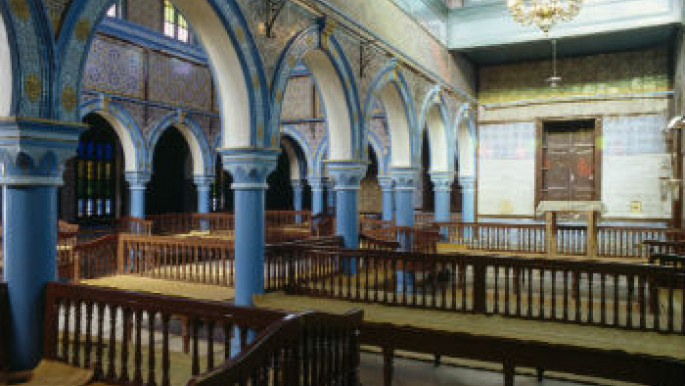Synagogue firebombed as hundreds are arrested and dozens injured during fresh Tunisia unrest
Clashes have led to more than 200 arrests and dozens of injuries as protesters across the country vent their anger over austerity measures.
Spokesman for the Tunisian interior ministry Khalifa Chibani told local radio that 49 police officers were wounded during clashes across the country and that 206 "troublemakers" were arrested.
Properties were damaged, he said, including a branch of the Carrefour supermarket chain in the suburbs of Tunis that was looted.
Chibani however omitted mention of two anti-semitic attacks that took place the same night on the island of Djerba, home to the north African country's ancient Jewish community.
A Jewish religious school was attacked with petrol bombs, causing some damage but no injuries.
"Unknown people took the opportunity of the protests and threw Molotov cocktails into the lobby of a Jewish religious school in Djerba," the head of the local Jewish community, Perez Trabelsi, told Reuters on Wednesday.
Officials of the historic Ghriba synagogue reported that it had also been firebombed, yet the fire had been contained and no injuries had been reported.
 |
|
| Officials of the historic Ghriba synagogue reported that it had also been firebombed, yet the fire had been contained and no injuries had been reported [Getty] |
"There was a failed attempt to burn down the synagogue in the Jewish Quarter of Djerba through the use of Molotov cocktails, but thank God, no one was hurt and security and civil protection are now doing their duty," stated Elie Trabelsi, son of Perez Trabelsi, on Facebook.
Ghriba synagogue is believed to date back to 586 BC, founded by Jews fleeing persecution in Jerusalem. It is a popular destination for pilgrims, however visitor numbers have sharply declined since it was targeted by an al-Qaeda suicide bomber in 2002, killing 21 people.
There were no official protests in Djerba, an island known for its tourist resorts, however it was reported that attackers took advantage of the reduced police presence as many had been stationed elsewhere in the country to combat the unrest.
Police and army forces were deployed in several cities during the night, including in Tebourba 30 kilometres (20 miles) west of the capital Tunis, where hundreds of young people took to the streets after the funeral of a man in his 40s who died in unrest on Monday night.
An autopsy was carried out on Tuesday to determine how the man died, however the results were not made public as controversy continued over his death.
The police insisted they did not kill him, and said he suffered from "respiratory problems".
 |
|
| Tunisia has seen several days of demonstrations after tax hikes were introduced at the start of the year as a tough new budget was implemented [Getty] |
Prime Minister Youssef Chahed decried Monday night's unrest, telling a radio station that "we didn't see protests, but instead people breaking things, stealing and attacking Tunisians".
"The government is ready to listen, but every person wanting to demonstrate must do so peacefully," he said.
Unrest was also reported in the southern city of Gafsa, in Kasserine in central Tunisia and in Sidi Bouzid, the cradle of the protests that sparked the 2011 Arab Spring uprisings.
Tunisia has seen several days of demonstrations after activists and politicians denounced hikes in value-added tax and social contributions introduced at the start of the year as a tough new budget was implemented.
Protests are common in the North African state in the month of January, when Tunisians mark the anniversary of the 2011 revolt that unseated dictator Zine El Abidine Ben Ali.
The country has been hailed for its relatively smooth democratic transition but seven years after the revolution tensions over economic grievances are high.

![Palestinians mourned the victims of an Israeli strike on Deir al-Balah [Getty]](/sites/default/files/styles/image_684x385/public/2024-11/GettyImages-2182362043.jpg?h=199d8c1f&itok=xSHZFbmc)


![The law could be enforced against teachers without prior notice [Getty]](/sites/default/files/styles/image_684x385/public/2178740715.jpeg?h=a5f2f23a&itok=hnqrCS4x)
 Follow the Middle East's top stories in English at The New Arab on Google News
Follow the Middle East's top stories in English at The New Arab on Google News

![Palestinian journalists in West Bank [Getty]](/sites/default/files/styles/image_330x185/public/2167088057.jpeg?h=a5f2f23a&itok=smdkN-46)
